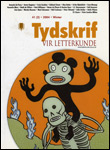Masculinity and nationalism in East African hip-hop music
DOI :
https://doi.org/10.4314/tvl.v41i2.29671Mots-clés :
East Africa, hip-hop music, masculinity, nationalismRésumé
East African music aligns itself with nationalistic desires while attempting to create a transnational and regional agenda that goes beyond individual nation-states. Hip-hop music appears at pains to define itself as different from the western art-forms with which it is hastily associated by instantiating localized forms and creating a different locution. This paper surveys East African hip-hop to demonstrate that the music is a productive site upon which the local, the national, and the global contest and negotiate. We demonstrate that central to the music's identity politics is the notion of masculinity, in which the construction of community is interpreted as a masculine enterprise. The audiences also invest the music with political and nationalist meanings that are fraught with sexualized readings. On the whole, the music rejects hostile nationalism but male artists tend to represent women negatively in their grand national, regional, and pan-African projects. Indirectly indicating the depth of the hegemonic masculinism they operate under, women artistes express a desire to deconstruct male constructs. At the same time they suggest that, in spite of themselves, their critique has to be cautious and subtle.
Téléchargements
Références
...
Téléchargements
Publiée
Numéro
Rubrique
Licence
(c) Copyright Tydskrif vir Letterkunde 2004

Ce travail est disponible sous licence Creative Commons Attribution - Partage dans les Mêmes Conditions 4.0 International.


 https://orcid.org/0000-0001-6465-6584
https://orcid.org/0000-0001-6465-6584


.png)